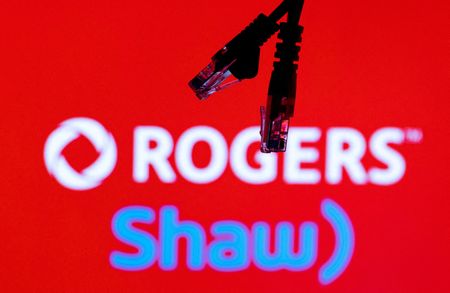 1
1 1
1

By Aditya Soni and Chavi Mehta
(Reuters) -Canada on Friday approved Rogers Communications Inc’s C$20 billion ($14.8 billion) buyout of Shaw Communications after securing commitments from them to promote competition in a market with some of the highest wireless bills in the world.
The final nod from Minister of Innovation, Science and Industry Francois-Philippe Champagne capped two years of antitrust uncertainty and paves the way for the creation of Canada’s No.2 telecoms firm.
Since the deal was announced in March 2021, consumer advocates and politicians have opposed it on worries it could lead to higher prices due to an overlap between Rogers and Shaw’s wireless divisions.
To ease the concerns, Champagne outlined 21 conditions that included asking Rogers to set up a Western headquarters in Calgary, create 3,000 new jobs in Western Canada and invest C$5.5 billion to expand 5G coverage and services.
If it breaches the commitments, Rogers will have to pay a fine of as much as C$1 billion, Champagne said at a news conference in Ottawa.
The deal approval came as the minister agreed to the transfer of wireless licenses held by Shaw’s Freedom Mobile unit to Quebecor Inc-owned Videotron – a proposal that helped resolve antitrust concerns.
Champagne has secured a commitment from Videotron that it will offer plans at least 20% cheaper than competitors and invest C$150 million to upgrade Freedom Mobile’s network in the next two years, or risk a fine of up to C$200 million.
When asked about how these commitment will be enforced, Champagne said, “I will (enforce it). Am a lawyer and it’s a contract, I know how to read a contract and enforce them. And it’s subject to arbitration.”
Champagne said if wireless prices do not go lower, he would seek further legislative and regulatory powers.
FREEDOM SALE
The sale of Freedom Mobile to Videotron would create another major national player and help lower prices, the minister said. However, consumer advocacy groups were not convinced.
Rosa Addario, a spokesperson for internet advocacy group OpenMedia, said the concessions sought by the government were unlikely to result in lower prices.
“This is undoubtedly going to harm our competition, our choice and will make our bills more expensive,” Addario said.
Shares of Shaw rose more than 3% to C$40.43, just below the offer price of C$40.50. Rogers was down 1.6%.
The Roger-Shaw merger had faced intense opposition from Canada’s antitrust regulator whose efforts to block it were rejected by the Competition Tribunal and a Canadian court.
Its approval now paves the way for the deal to close on April 7, after the completion date was delayed for a fifth time.
The combined company will benefit from Rogers’ strong presence in urban Ontario and Shaw’s dominance in the sparsely populated regions of Western Canada.
The merger also unites two of Canada’s wealthy families whose companies have for long fought for market share.
($1 = 1.3535 Canadian dollars)
(Reporting by Eva Mathews, Juby Babu, Aditya Soni and Chavi Mehta in Bengaluru and Steve Scherer in Ottawa and Maiya Keidan in Toronto;Editing by Tom Hogue, Christian Schmollinger and Arun Koyyur)